Leon reviews leon dead and marriage

Yesterday, I watched this movie twice, and I still felt it was very touching. First of all, I think a good movie will bring viewers a lot of immersive experience. Simply put, when you watch the dialogue between the leading actor and the leading actress, you will see the feelings you have experienced. For example, the inarticulate Leon buys Martina a dress and presents her with the gift with a clumsy gesture, a wary but expectantly look in his eyes.
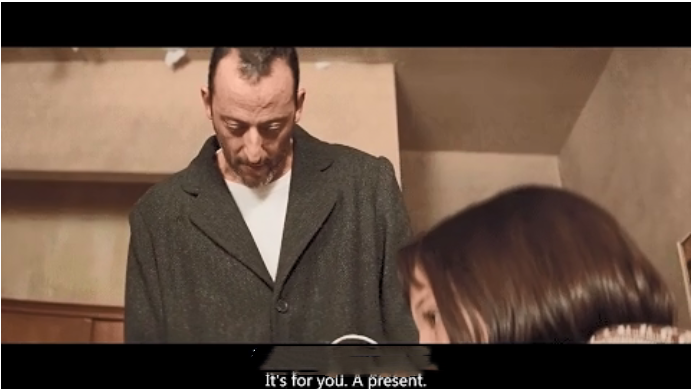
Another example: Leon saw Martina chatting with a gangster, and he talked to her in a serious way.
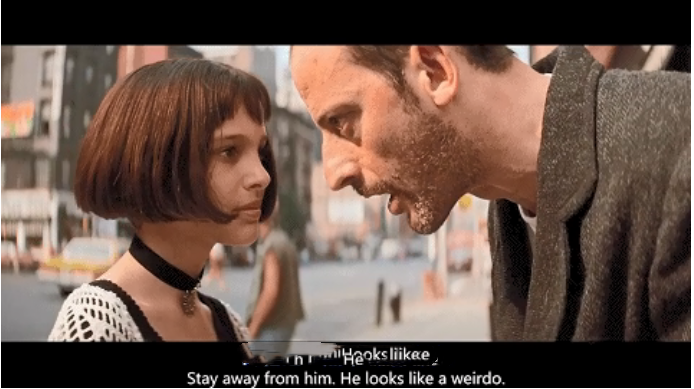
For example: Leon comforts a heartbroken Martina, and Han is a little cute.

The movie opens with a close-up of Leon receiving a mission, and then a packed action sequence in which the killer kills a bunch of people without being seen or seen. Then he took the subway by himself. The most special thing was that he liked to drink milk, which was a little cute. (It reflects from the side that he is a lonely man with his own preferences)
Then, Martina appears as a subjective shot overlooking a staircase, as if about to fall. It echoed her inner mood. This is a technique the director is very good at, using pictures to express the heart. We’ll come back to that a couple of times.
The camera moves up, two feet, colorful tights (compared to Leon’s all black), holding a cigarette (compared to her age), sitting dejected on the railing, very depressed. Leon upstairs, Martina hide smoke, also hide emotions, but was keen Leon noticed. Asked about the cut on her forehead, Martina lied again about falling off her bike. After Leon left, Martina asked her to keep the secret for himself, and then quietly put the smoke into a lollipop.
It’s a very, very vivid detail, a very accurate representation of Martina’s anxiety, her desire to leave her childhood behind, her pretense of maturity, and her habit of keeping her thoughts to herself. Here, the two characters come to an end. Every detail is directed to the heart of the character, but it is handled naturally and neatly. Can be explained by the picture, it must not use lines. When told in a script, there is usually a subtext (like the Martina lie).
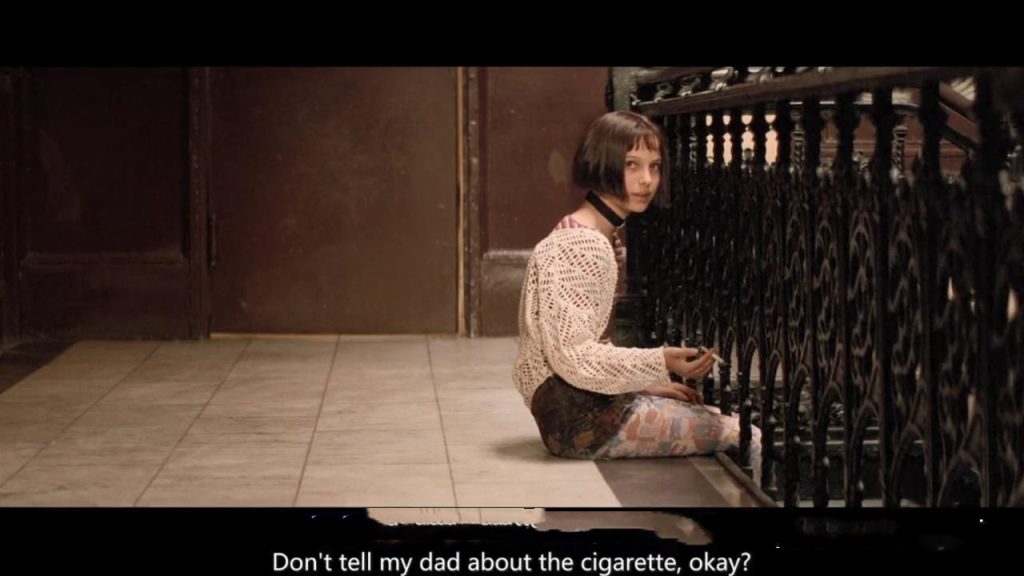
The next day, Leon comes back to see Martina with blood on her face and gives her tissues. Is life always this hard, or Is it just when you’re a kid? Leon: It sounds desperate, but in a sense, it’s two loners who are hooked up to each other — I’m in trouble, just like you. Mathilda dried the blood and Martina offered to buy milk. The two became half friends. Martina’s father was involved in a drug deal and was killed by a twisted police chief and drug dealer villain. Explain and highlight the metamorphosis with the detail of drug use. It is the “amazing accident” at the end of the first act that radically changes the hero’s fate and propels him into a new world.
When Mathilda returned from her shopping trip, she went straight to Leon’s door and asked to open it. To alone killer Lyon character, open the door is the first step that opens the heart door, and director forcedly Lyon was forced to a “must” situation, open the door is born, not open criterion at this moment just Matina goes to the supermarket and survive. After buying things back home, Martina witnessed the tragedy of her family was killed, but she was smart and did not flinch back, but calmly and bravely through the corridor guarded by the bad guys. When he reached the end, he rang the doorbell of the killer Leon with tears in his eyes and asked him for help. At this time the killer Leon is very entangled, in the end can not open the door. For Leon alone killer, open the door is the first step to open the door of the heart, and the director forcedly forced Leon to a “have to” situation, open the door is born, do not open is dead!
“Why would a lone killer take in a little girl?” The headache has gone away. Leon, wouldn’t a block of wood open the door? This extremely strong dramatic tension, is the scriptwriter dream of the diamond bridge.
Finally, the door opened, and for an instant, a light shone on Martina.
Talk to each other and introduce yourself. Martina herself explains her relationship with her family and her hatred of the villain — she killed her brother. Leon pretends to be a pig to make Martina happy — as the director says, this is the story of two children. We see the warmth of Leon.
Leon tried to get rid of her, but found she was friendless. Martina discovers the identity of Leon’s killer. (Well, it goes pretty fast.)
Take a glass of milk and switch. Get to know Leon’s killer rule — no women or children. And then there’s the trading price of the job. Martina immediately offers to trade her labor in exchange for Leon’s revenge (” initiative “is what makes the audience like the character).
At night Leon gets up, points his gun at the sleeping Martina, hesitates for a moment, then gives up. This detail is too important. Not only see Leon’s principle (do not kill women and children), but also express Leon’s inner struggle — to take in Martina for a long time, it is too reluctantly for him.
The next morning. Martina forcefully stated that she wanted to be a killer (what a lovely initiative). Leon was completely dismissive and wanted to go his own way. Martina is so logical. If you don’t take me in now, it’s like you didn’t open the door. (This also solves the problem of “two people who can’t walk together, but walk together”).
Martina fires her gun and scares Leon. Two people move. Become a “master or apprentice.” Leon told him to be professional!
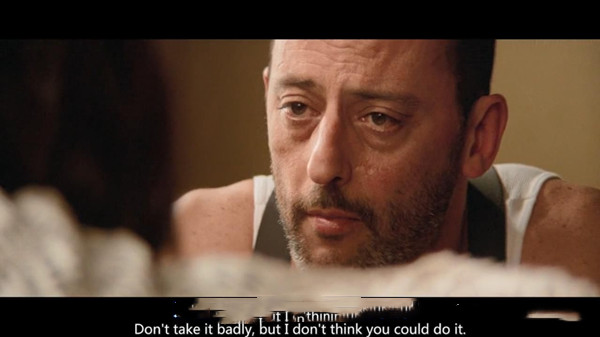
Leon taught Martina the rudiment. ranged sniping. A peek into the world of professional killers through the details of mirrors, clothing and breathing adjustments. Emphasize the principle of Lyon by the way.
Montage. Leon taught her how to use a gun. Martina did the housework, bought food, washed the dishes, and cleaned the guns. We do push-ups and drink milk and Martina eventually goes to aerobics. Leon still sleeps sitting up. Martina taught Leon how to write — change and growth are mutual, and each becomes a warmth for the other.
This is the “second step of character development” in genre films, usually in the middle of the second act, and the narrative style can be changed, such as by montage.
The two play a role-playing game to add comedy to the film, as well as show off Leon’s innocence and their closeness.
These scenes are meant to convey the intimacy of the relationship, not to interfere with the main story line, and are replaceable as long as they are interesting enough. However, it has been extremely interesting, and particularly suited to the strengths and personalities of the two characters.
Martina felt loved and looked happy. When it comes to the bonsai, the key prop, Leon says it has no roots, is lonely and silent, just like himself. Martina says it should change. It should take root.
Martina develops feelings for Leon. Whatever it is, Martina has taken the initiative to define her as love and to make sexual overtones — not a simple comedy, as role-playing might suggest, but, at a deeper level, an expression of her desire to leave her miserable childhood behind and grow up as an adult.
Leon chose to “irrigate” Martina by splashing water. Two people play, sweet and happy.
Leon see brokers, willing to give money to Martina, clearly express the feelings of the two people have progress. When Leon became literate, it was a sign of his own growth. The agent reminds him to want to be careful of woman, bury foreshadowing for the history of Lyon before. Leon said he actually wanted a woman.
See and small riffraff chat, rushed up like father discipline her, ask her to stop smoking, do not say dirty words.
Martina is bold again, Leon is spraying milk again. In fact, it was just that Martina’s stomach trouble had gone away.
The director especially likes to use a strong sense of contrast to show the effect. Martina is the outer girl, the inner daughter; And Leon is the appearance of the uncle, the heart is too.
There was stress and worry (in contrast to the initial hesitation) before Leon went on the mission. Because he is tied up.
Martina returns home to the scene of the crime. It is also her inner wound, the most painful place.
It is really convenient to express the heart knot and scar of the character directly in the physical scene. At this point, the director used a rabbit doll to represent her remaining soft childlike innocence. Run into a villain.
The encounter villain, is Martina vengeful, a strong request to formally accept his Lyons as an agent.
Martina watches cartoons at home. Leon comes home and immediately switches to the news channel. This detail is the same as the previous one in which the cigarette was replaced with a lollipop, again highlighting Martina’s attempt to disguise her nature and pretend to be mature.
Leon was injured, and he sewed it again. He’s just killed someone, and he’s depressed. Meanwhile, Martina slips money into him and hires him to kill. It’s logical, Leon says, that when you kill someone, your life is changed forever.
Get the character in a certain mood before the scene begins. The next confrontation between the two, which takes place not in an everyday moment, but shortly after the killing, gives the audience a better understanding of the characters’ reactions.
Love or die, Martina stresses. Leon was too tired to talk to her. Martina: Loaded. If you win, you’ll stay with me forever. If you lose, you’ll go back to your old lonely life. So Martina really, really wants to be loved. And with such a strong character.
To Leon promised to take Martina to perform the task, more difficult, it can be said that the screenwriter’s super test! But when the writers make Shematina a strong woman, and take such an extreme action, finally have a persuasive. Let Lyon two times into the “have to” situation. After the gunshot went off, notice that Martina was scared herself. Hold the bunny tight. The split and unified details of the performance, suddenly make the character real, three-dimensional.
The next play, Leon and Martina have shown considerable “initiative”.
Leon asked Tony to leave the money to Martina. (Looks back, ringtrick is Leo’s sacrifice way, this is a hint, hidden very much in the future)
Leon said goodbye to Martina. You made a difference to me. (to avenge Martina’s death).
And Martina is in a bad mood, kink along while, the decision goes to revenge alone. Killed the villain alone, but was caught by the villain, and finally Leon saved Martina. The two embraced into a classic.

Finally, Leon disguised himself as a policeman and went to the gate. The director gives us a wonderfully subjective shot as we slowly follow Leon’s vision from darkness to light (the moral is too apt). But the villain is still there, and we fall in Leon’s sights.When you’re one step away from light, you’re forced to retreat completely into darkness.
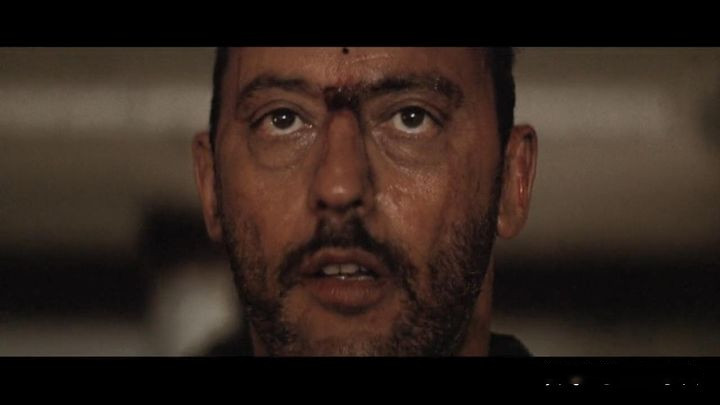
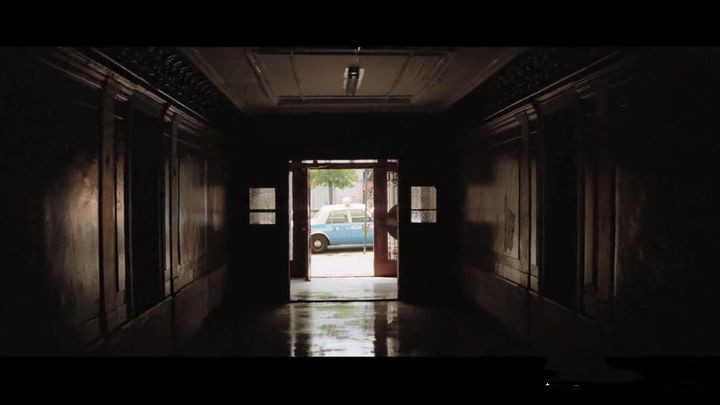
In fact, these images in the film are not deliberately repeated depiction, but appear very natural. The milk is for the better supplement of a killer’s protein, but it also implies that Leon is actually a pure boy in his heart. The potted plant implies the killer’s rootless life. When the potted plant finally lands and takes root, it also implies the stability of Leon, while the stability of a killer means death. And men will put potted plants on the window side of the sun every time they come to the house, implying that men desire freedom, and men finally go to the door, yearning for freedom echo.
Sometimes I wonder what is the intention of the director when the hero dies? Probably to echo the beginning of the movie.If Leon had not opened the door, he would not have died, but the little girl would. But Leon opened the door and saved the life, so the little girl didn’t die, but he did. Thus a trade-off was completed — his life, for the girl’s. Because of the exchange, Leon’s life was shorter, but it was also more real — to sleep in bed, to be cared for, to love and to be loved, etc. — so the exchange was a process of redemption.
